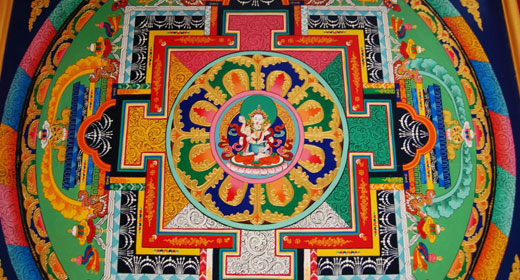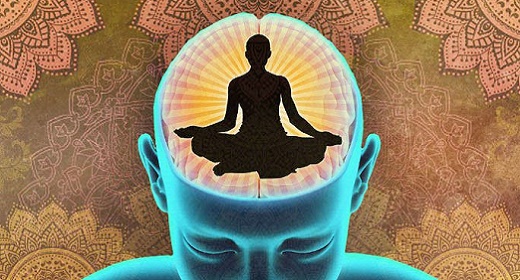by Bill Scheffel: I once heard Tsoknyi Rinpoche comment that terms for the unconditional – such as “Buddha nature” or “unborn awareness”…

need to be updated from time to time. Even if we know what they mean (we know only in moments), because of repetition they may cease to move us, become clichés, get stale. There is no need to stick to the same spiritual terms we have always used – not only can they become worn out, they also can back us into narrow or even intolerant corners.
In his recently published book, The Intelligent Heart, Dzigar Kongtrul Rinpoche uses the term “universal mind” to refer to Buddha nature. When I came across universal mind in my reading of his book, I felt strangely liberated. It was a term I could feel affection for, and I loved its sweeping inclusion of everything (which any term for the absolute is meant to do). Certainly this is the spirit Kongtrul Rinpoche intended for the term: that it speak to the heart.
Kongtrul Rinpoche contrasts universal mind to “small mind,” his term for the self-clinging, self-identified part of ourselves; the place we typically inhabit that is unable to truly empathize with others, develop compassion and see the universality of consciousness. The compact simplicity of small mind makes it easily grasped, and blunt. Shunrhu Suzuki-roshi also used small mind, which he contrasted to “big mind,” his term for unborn awareness, and one that to my ear evokes universal mind.
There is a saying from the lojong tradition of Tibetan Buddhism: Drive all blames into one. The direction for “blame” is the small mind, our ego, our tendency to be selfish. More than one teacher has commented that this saying is universal to all schools of Buddhism, since overcoming ego is what Buddhism is all about. But it is clear that this universality is common to the essence of all spiritual traditions. Consider this quote from the American Christian mystic Joel Goldsmith:
She who has found her inner self realizes that she is one with all men/women, animals and things. She knows now that what affects one touches all. The universality of this truth is found in all scripture.
In order to avoid our myopic tendencies, besides exposing ourselves to a variety of terms for the unconditional, it is necessary to expose ourselves to other spiritual traditions as well. A close reading of Joel Goldsmith’s little-known classic, The Infinite Way,has shown me how identical his mystic Christian path is to Buddhism; not identical in all methods and certainly not is all words, but in spirit and ultimate destination. Goldsmith speaks of “Christ consciousness.” How different is Christ consciousness from Buddha nature? Goldsmith, needless to say, also uses the word “God.” In reading the book, one might be uncomfortable encountering the word God. But for a Buddhist, if one tries using the word “awareness” instead of God, in many instances the meaning becomes familiar and easily identified with.
In the Buddhist path, the middle way – a name for Buddhism itself – is contrasted to the two extremes that veer from the middle way: nihilism and eternalism/theism. In this regard, Christianity is typically labeled a theistic religion. In the case of contemplative Christianity (the practicing essence of Christianity,) this label is misleading. Buddhism posits that the theistic belief in an external savior is both extreme and false. But in Goldsmith’s view, and other contemplative traditions, there is no notion that we will be saved from outside. The work must be done oneself, and the realization is an inner one.
In these days of division and widespread intolerance, it is crucial that all of us practicing the Buddhist path become spiritually sophisticated: that we become multi-cultural and “multi-spiritual”; not only tolerant but actively interested in other. The words we use and the knowledge we have of other traditions is a key.
Bill Scheffel is a writer, creative writing teacher and videographer who has directed Shambhala Training since 1980. Bill was a student of Chögyam Trungpa Rinpoche and taught classes in meditation, creative writing and poetry at Naropa University for thirteen years. Currently, Bill teaches online classes in creative writing and the I Ching. For more on Bill see Vertical Time.









































